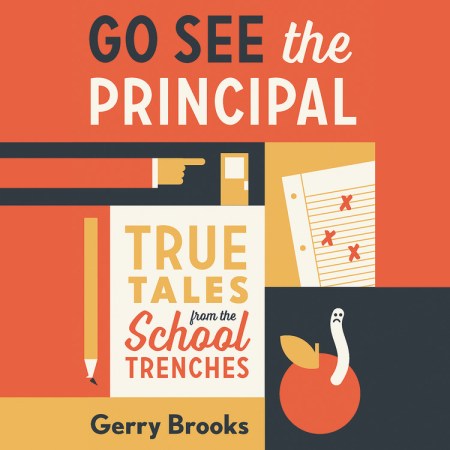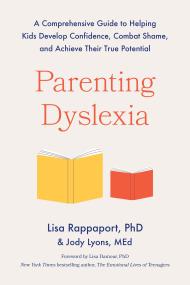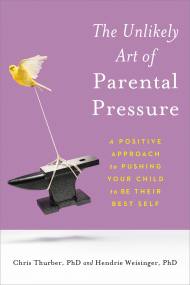Shopping Cart
Go See the Principal
True Tales from the School Trenches
Description
Gerry Brooks is an elementary school principal turned YouTube celebrity who entertains K-12 teachers, administrators, and parents across the country. He tells jokes with the kind of mocking humor that gets a laugh, yet can be safely shared in school. After all, even great schools have bad days — when lesson plans fall through, disgruntled parents complain, kids throw temper tantrums because they have to use the same spoon for their applesauce and mashed potatoes, and of course, dealing with…The Horror! The Horror!…dreaded assessments. Ranging from practical topics like social media use in the classroom and parent-teacher conferences to more lighthearted sections such as “Pickup and Dropoff: An Exercise in Humanity” and “School Supplies: Yes, We Really Need All That Stuff,” Go See the Principal offers comic relief, inspiration, and advice to those who need it the most.
What's Inside
Excerpt from Go See the Principal: True Tales from the School Trenches
TECHNOLOGY AND SOCIAL MEDIA: A Double-Edged Sword
I hate social media. I know. I know exactly what you’re thinking: how hypocritical. And it is. Social media has been a tremendous blessing in my life. Without it, I wouldn’t have this platform. I wouldn’t have been able to meet and hear from so many great educators and to express my support of educational issues. However, I can’t ignore how detrimental social media can be to a teacher, classroom, grade level, and school. Social media needs to be used correctly and it also needs to be monitored regularly—for kids and for teachers.
Here’s one example of when social media + schools can be positive: anytime you can use it to quickly communicate with school parents. We use newsletters, Facebook, websites, school apps, and mass calling systems to get the word out about fundraisers, theme days, athletic events, and days off. However, a variety of communication methods is key—not every parent has a computer or smartphone, which is why we don’t want to rely solely on, say, Facebook.
Many teachers do have Facebook pages for their classrooms, which can be a fantastic way to share photos and stories from the school day, but the school needs to monitor those pages closely. There’s nothing wrong with a post captioned “Here was our class party” or “Here’s a child who dressed up as Harriet Tubman who did such a good job on her book report.” But you need parent permission to post pictures of their kids online. Also, keeping that Facebook page means the added responsibility of monitoring comments, which may be more responsibility than overworked teachers need.
Otherwise, anytime a parent complains on Facebook, he or she is now complaining to all 25 parents. You may have two or three jump on the bandwagon and the teacher feels absolutely horrible. A post as simple as, “Gosh, there was a lot of homework tonight” can open the door to other complaints from parents. And as we all know, when you’re behind a computer it’s easy to misread statements as negative. It’s kind of like driving: when you’re in the car, you’re more apt to be negative about other drivers than you would if you were face to face with that person. On social media, there’s always one parent who will chime in with something negative. I highly suggest if you have a social media page for your classroom that you shut off comments or set the page so comments need to be approved before publishing.
I have called parents about negative Facebook posts. I’m careful not to dress them down or demand that they delete their posts, but instead to say, “I’m so sorry we’ve put you in the position where you feel like you can’t come directly to us. If you have a concern, please come to me.” This always works—I don’t aim to make them feel bad, but I can tell they’re thinking, “Why in the world didn’t I just call the school?” or, more likely, “Why didn’t I just keep that to myself?”
I find that parents will say that they were frustrated with the situation and didn’t realize how negative it sounded. They just thought they were talking to their friends and didn’t think of how the school or the teacher would take the comment. Ninety-nine percent of our parents want positive relationships with one another and the school because they see the need to work together. There’s always going to be that 1 percent who will rip you apart, but the bottom line is you will never change that person. Sometimes you just need to let it go.
A major frustration with social media is when it involves parents who listened to their children and took them at their word rather than following up with the teacher when something might sound unreasonable or silly. I had a parent post on Facebook, “How stupid is it that the school has a new rule that kids can’t run on the playground during recess. Isn’t that what recess is for?” This caused several other jerky parents (that’s right, I said it) to chime in with what they considered to be stupid rules. I called the mother and asked where in the world she got that information and she explained that her daughter told her they weren’t allowed to run on the playground. I explained that the students were welcome to run on the playground except in the mulch area (this is the area where we ground our playground equipment) because it’s often congested with students and there are lots of poles and pieces of equipment they can run into if they aren’t paying attention or trip over while running. The parent completely understood the need for that rule when I spoke to her, but unfortunately, she caused a negative situation by assuming the information her child gave her was true, even though it was ridiculous.
There are times, of course, when teachers don’t think social media through well—like when they friend parents, which gives the parents access to their lives in a way that might not be so smart. Sometimes a teacher will call in sick and then parents see a photo of her at a concert or basketball game and ask us, “Why is she gone, yet on Facebook, we see she’s somewhere else today?” (The bigger lesson here, of course, isn’t just about teachers friending parents online, but also common sense and honesty.)
We’ve also had issues when teachers post pictures of parents that they’re dating, which isn’t wise in several ways. It’s unprofessional to date your classroom parent. Obviously, that’s your personal life, but when you post on social media for the world to see that you’re in a relationship with Billy’s mom and Billy wins a science fair, parents will say, “Billy’s getting special treatment because Mr. Smith is dating his mom.”
Parents need to be more alert than anybody when it comes to technology and social media. I’m leery when kids get phones at a young age—I see children as young as second grade texting their friends. A lot of parents feel their kids need a phone because they want to know where their children are after school, but just know that when you give child a smartphone, you’re opening him up to social media. You may say, “My child will never do this or that with her phone,” but children are smart, and they will do whatever they want to do when it comes to social media if they’ve got a smartphone.
However, I understand that social media is a form of socialization for kids. That’s how they communicate right now. Keep in mind that their group text, Snapchat, or Instagram is their version of hanging out at the drive-in or whatever you did at their age.
My advice? Prolong your child’s phone-free life for as long as possible. I went through this with my brother and sister-in-law. They were stressing because my sixth-grade nephew wanted a phone. A part of me thought, “Yes, he should have one for socialization,” but another part of me was like, “Oh my gosh, you’re opening up a real can of worms.” And we saw it right away—suddenly, he’s a kid who’s got his phone at the dinner table and who’s upstairs in his room on his phone rather than down with the family. His parents did a great job of saying, “You can use your phone during these hours.” Monitor the phone, and know what apps are on there. Yes, it’s good to give kids a sense of privacy, but you absolutely need to know what YouTube channels they visit and what apps they use because there are people who use social media to prey on children—even if it’s not in a sexual way. I’ve had kids at school bring in their parents’ credit cards and buy swords and shields in online games, who get around filters to inappropriate sites. It’s just the nature of how intelligent children are, the things they think they can get away with, and the things they actually do get away with.
I probably understand this stuff more than most principals and parents. I’ve taken down more than one video after realizing I’d uploaded some content that made people mad. One of the most popular videos I ever posted was called “Teacher Bumper Numbers,” which made fun of those 26.2 bumper stickers people put on their cars after they run marathons. The video suggested bumper sticker numbers for teachers, like how many minutes we get for lunch and how many minutes we get for the bathroom. The very last one was 4,162, representing the number of times people have said to me, “You get your summers off.”
That video got picked up by a jogging influencer who has millions of viewers, and then it went through media outlets like Diply. Many comments from noneducators were rude, saying, for example, “You get paid plenty,” “You do get paid to not work over the summer,” “You knew what you were getting into,” and “Teachers make a lot more than mechanics.”
It didn’t bother me, but it started to bother the teachers, and I didn’t want that, so I took it off Facebook—and I’ve taken other videos down for less. People will say, “That’s ridiculous, you took it down for one or two parents.” Well, I know what it’s like to be a parent and I wouldn’t want to feel offended by something my principal posted—unless it’s a humorous video about parents who never turn in a field trip form all year. If you’re offended by that, turn in your flipping field trip form.
Before I put up a video, I screen it for several people like my best friend or teachers who might say, “Wow, that’s not going to go over well,” or “You know, you need to think about that.” I’m not afraid to put controversial stuff up, especially if it has to do with a lack of support for teachers, but I don’t want an argument between teachers and parents or teachers and noneducators. I also just don’t have time to monitor every one of the 3,000 comments I’ll get on a video, so if they’re heated, it’s just not worth it. When I put a new one up, I will usually spend about an hour monitoring the content to make sure it’s not too controversial, but that’s it. I don’t have much time to interact with the commenters because if you speak with one viewer, you have to
speak with them all.
My personal focus on social media is to put out videos, support teachers, and try to be funny. It’s not to monitor comments, comment back, or email. I understand how much time I have to put in as a principal and I don’t let social media in any way, shape, or form get in the way of that job.












